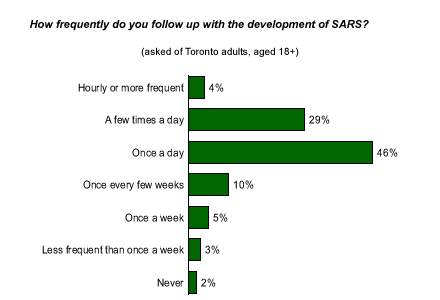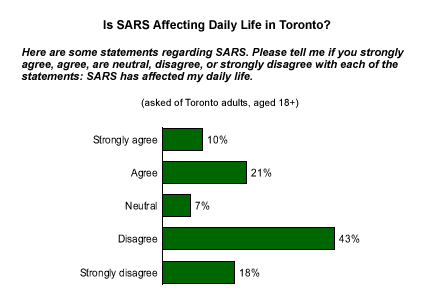First in a two-part series on Torontonians' attitudes toward SARS
The spread of severe acute respiratory syndrome (SARS) shows little sign of letting up in Canada's largest metropolitan area, and Toronto health officials are escalating their efforts to manage the spread of the disease. At a provincial SARS briefing on April 15, Dr. James Young, Ontario's commissioner of public security, had the following advice for Toronto residents: "If you feel ill, with muscular aches and headache before you have a fever -- stay home and isolate yourself." With the Canadian death toll from SARS at 14, and hundreds more SARS cases suspected, even this past weekend's Easter services were affected. The Roman Catholic Archdiocese of Toronto instituted new rules for religious services, such as prohibiting taking communion wine from the cup, telling priests to place communion wafers on the hand only (not on the tongue), and prohibiting priests from shaking hands with parishioners.
How is the general population of Toronto dealing with the threat of SARS in the city? A recent Â鶹´«Ã½AV Poll* of Torontonians sheds some light on this subject.
SARS Awareness
The poll, conducted April 11-13, indicates that most Torontonians are well aware of SARS. In fact, 93% of Toronto residents have heard of the disease, while only 7% have not. Not only are Toronto residents aware of SARS, they are also keeping close tabs on its development. More than three-quarters (79%) of Toronto residents are following up on the development of SARS at least once a day. While only a small number report checking on SARS developments hourly (4%), more than a quarter (29%) do so a few times a day and almost half (46%) check in once a day. Much smaller percentages follow up on the development of SARS once every few days (10%), once a week (5%) or less than once a week (3%), and only 2% report not following SARS at all.

Concern About SARS
All hospitals in Ontario, and especially those in Toronto, are functioning under some level of restriction. Visits to patients are not permitted and elective and non-critical surgeries, as well as other types of treatments, have been suspended. Despite these major changes in healthcare facilities, most Torontonians seem to be conducting their day-to-day lives in a relatively normal fashion. Less than a third of Torontonians either agree (21%) or strongly agree (10%) that SARS has affected their daily lives. Forty-three percent disagree and 18% strongly disagree that SARS has affected their daily lives.

Although most Torontonians appear to be keeping to their usual routines, most also express some level of worry that they or a family member will be exposed to SARS. Although only 14% say they are very worried, a third (33%) are somewhat worried about exposure to SARS. Another 36% are not too worried. Fewer than one in five (17%) Torontonians are not at all worried that they or a family member will be exposed.

Bottom Line
Residents of Toronto appear to be taking SARS seriously. They are interested in following its development and express concern regarding exposure to SARS. However, as the SARS crisis enters its second month, most Torontonians have not let this threat affect their daily lives. Only time will tell if the level of concern about SARS in Toronto is prompting Toronto residents to take the necessary precautions to successfully limit the spread of this serious illness.
Next week, we will examine Torontonians' views on how the local government has handled the SARS outbreak and their expectations regarding future medical developments.
*Results are based on telephone interviews with 504 adults in Toronto, Ontario, conducted April 11-13, 2003. For results based on the total sample of national adults, one can say with 95% confidence that the maximum margin of sampling error is ±5%.